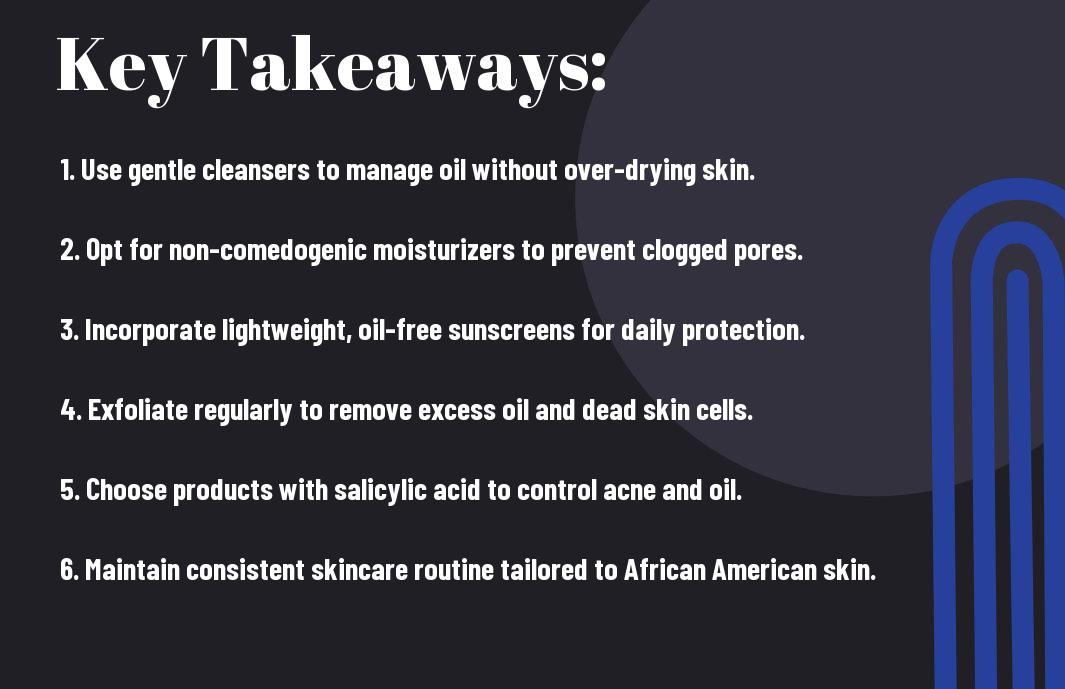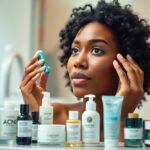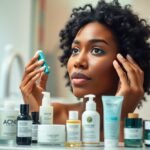
African American skin is often characterized by its unique texture and tendency for excess oil production. As I investigate into finding the ideal skincare products, it’s important for you to understand how to balance your skin’s natural oils while maintaining moisture and preventing breakouts. In this post, I will share effective strategies to help you select products that cater specifically to your skin type, ensuring that you achieve a healthy, radiant complexion without sacrificing hydration. Let’s explore how to optimize your skincare routine for your unique needs.
Key Takeaways:
- Understanding skin type is important; African American women often have diverse skin types, which influence oil production and product choice.
- Opt for non-comedogenic products to prevent clogging pores while maintaining necessary moisture levels.
- Incorporate oil-balancing ingredients such as salicylic acid or tea tree oil, which can help regulate oil production without overdrying the skin.
- Choose moisturizers with lighter textures, like gels or oil-free lotions, to avoid excessive oiliness while providing hydration.
- Utilize natural oils, like jojoba or argan oil, in moderation; they can mimic the skin’s natural oil and maintain balance.
- Sunscreen is non-negotiable; choose oil-free formulas that protect without adding shine or heaviness to the skin.
- Regular exfoliation helps remove dead skin cells and prevent excess oil buildup, which can lead to breakouts.

Navigating the Unique Skin Needs of African American Women
Understanding the specific skincare needs of African American women requires a keen appreciation for the unique characteristics of our skin. Numerous studies indicate that we often have thicker skin and increased oil production, which can lead to a heightened susceptibility to conditions like hyperpigmentation and clogged pores. Tailoring my skincare routine to address these specific traits allows me to maintain healthy, radiant skin.
The Role of Natural Oils in Skincare
Integrating natural oils into my skincare regimen can be a game-changer, especially for African American women. Oils like argan and jojoba not only provide hydration but also help balance oil production, preventing skin from becoming overly dry or greasy. These oils are packed with vitamins and fatty acids that nourish and protect my skin barrier, making them valuable allies in achieving overall skin health.
Factors Affecting Skin Health and Oil Production
Several factors influence my skin’s health and oil production, including genetics, diet, hormonal changes, and environmental elements. Understanding how these variables interplay can guide me toward more effective skincare choices tailored to my unique skin type. For example, hormonal fluctuations, particularly during menstrual cycles or pregnancy, can lead to increased oiliness or breakouts, emphasizing the need for products that adapt to these changes.
- Genetics play a significant role in your skin type.
- Dietary choices can impact oil production and skin clarity.
- Hormonal changes lead to fluctuations in oiliness.
- Environmental factors such as humidity affect skin hydration.
Understanding the interplay between these factors helps me make informed decisions about my skincare routine. I consider how stress may lead to increased oil production, while a balanced diet rich in antioxidants can promote healthier skin. Research shows that specific foods like Omega-3 fatty acids found in fish help maintain skin elasticity and moisture. Recognizing these nuances allows me to cultivate a proactive approach to caring for my skin.
- Stress can exacerbate oil production and skin breakouts.
- Hydration is a key component of maintaining skin health.
- Sun exposure can contribute to skin issues, necessitating regular SPF application.
- Seasonal changes can influence product choices and routines.

The Oil Production Paradox: Harnessing the Benefits
Understanding your skin’s oil production can feel paradoxical. While excess oil often leads to shine and breakouts, the right amount of oil plays a fundamental role in maintaining skin health and preventing premature aging. Rather than focusing solely on oil reduction, embracing its benefits can lead to a more balanced and nourished complexion. Finding the sweet spot between oil production and skin care will help you celebrate your unique skin.
Benefits of Natural Oils for Hydration and Nourishment
Natural oils are fantastic allies for your skin, serving as potent hydrators and nourishing agents. Oils like jojoba and argan mimic your skin’s natural sebum, promoting moisture retention without clogging pores. Incorporating these oils into your regimen enhances not only hydration but also provides crucial fatty acids and antioxidants, protecting your skin from environmental damage and promoting a radiant glow.
Identifying Overproduction vs. Underproduction of Oils
Understanding whether your skin is overproducing or underproducing oils is key. Signs of overproduction include excessive shine, enlarged pores, and frequent breakouts. Alternatively, if your skin feels tight or dry despite using moisturizers, you might be experiencing oil underproduction. Regular assessments can help you tailor your skincare routine, adapting to your skin’s specific needs.
To differentiate between overproduction and underproduction of oils, closely observe your skin’s behavior throughout the seasons and your skincare routine. For instance, if oily areas appear alongside dryness or irritation, this indicates that your skin is struggling to retain moisture. Conversely, if your complexion remains perpetually oily despite regular cleansing, your skin could be overcompensating for a lack of moisture. Keeping a skincare diary may assist you in recognizing these patterns, allowing you to adjust your products accordingly and achieving that desired balance.
Tailoring Skincare Regimens to Enhance Natural Oil Balance
Creating a customized skincare regimen can significantly improve your skin’s natural oil balance. By focusing on your unique skin type and its specific needs, you can select products that nourish while preventing excess oil production. Incorporating a blend of cleansing, moisturizing, and treatment products ensures that your skin receives the support it requires to maintain its natural glow without tipping the scales into an oily mess.
Key Ingredients to Look For in Skincare Products
Selecting the right ingredients can be a game-changer in achieving balanced skin. Look for non-comedogenic oils like jojoba and sunflower oil, which mimic your skin’s natural sebum. Additionally, humectants such as hyaluronic acid and glycerin hydrate without adding to oiliness, while exfoliants like salicylic acid help manage breakouts by unclogging pores. Incorporating antioxidants like vitamin C can also bolster your skin’s defense against environmental stressors.
Best Practices for Application Techniques and Timing
Application techniques play a vital role in maximizing the effectiveness of your skincare products. To prevent over-application and ensure your products absorb well, use a gentle tapping motion when applying serums and moisturizers. Always apply products on slightly damp skin to lock in moisture better, and follow a routine twice a day—morning and evening—for optimal results. Keeping a consistent schedule allows your skin to respond positively, adjusting its oil production favors whatever your skin craves most.
Timing your skincare routine is equally important. Applying products after cleansing, while your skin is still moist, enhances absorption and effectiveness. In the morning, I recommend a light layer of moisturizer followed by sunscreen to protect against UV damage. In the evening, focus on deeper hydration and treatment products that work while you sleep, facilitating rejuvenation without overwhelming your skin. Sticking to a routine gives your skin a chance to adjust, helping you maintain that perfect oil balance.
Dismantling Myths About Oily Skin in African American Communities
Frequently, misconceptions around oily skin circulate within African American communities, influencing skincare routines negatively. Many believe that oily skin is inherently bad, leading to an overemphasis on elimination rather than balance. This perspective can cause unnecessary distress and misguidance in how to care for our skin. Understanding that oil serves to protect and moisturize is fundamental in reframing how we approach oily skin issues.
Understanding Misconceptions Around Moisturizing
There’s a common belief that if you have oily skin, you should skip moisturizing altogether. This stance can be misleading and detrimental. Moisturizers, especially oil-free or gel-based options, help maintain skin hydration without clogging pores. For oily skin, the right moisturizer prevents the skin from overproducing oil in a counterproductive cycle. By keeping the skin balanced, you can achieve a healthy glow instead of excess shine.
The Impact of Cultural Narratives on Skincare Choices
Cultural narratives significantly shape how we approach skincare, often leading to misinformation. Many African American women function under the belief that skincare products tailored for “normal” skin types are unsuitable for oily skin, stemming from historical perceptions about beauty and skin health. These narratives can result in a reluctance to explore products designed specifically to address our unique skin needs, potentially limiting our options for healthier skin.
Community discussions often reflect a blend of traditional wisdom and modern influences that can misinform skincare choices. For instance, a pervasive notion that oily skin should strictly avoid oils overlooks the countless benefits of incorporating specific oils, like jojoba or argan, which can balance sebum production. By challenging outdated beliefs and fostering conversations grounded in scientific understanding, we can collectively shift the narrative surrounding oily skin and embrace the full spectrum of available skincare solutions tailored for us.
Realign Your Skincare Routine: A Practical Guide
I’ve discovered that a well-structured skincare routine can work wonders for achieving healthy, balanced skin. By simplifying and tailoring your regimen, you can effectively balance your skin’s natural oils and improve your complexion. Adjusting my routine according to the specific needs of my skin type has been not only enlightening but transformative. Here’s how to get started with actionable steps that suit your unique needs.
Step-by-Step Routine for Healthy, Balanced Skin
| Step | Action |
|---|---|
| 1 | Cleanse daily using a gentle foaming cleanser to remove excess oil without stripping moisture. |
| 2 | Exfoliate 2-3 times a week with a chemical exfoliant to prevent clogged pores and promote skin renewal. |
| 3 | Apply a hydrating toner containing ingredients like witch hazel or rose water to balance skin pH. |
| 4 | Moisturize with a lightweight, oil-free formula that hydrates without adding excess grease. |
| 5 | Use sunscreen daily, ideally a broad-spectrum SPF tailored for oily skin to protect against UV damage. |
Recommendations for Products Tailored to Unique Needs
Pertaining to selecting skincare products, I prioritize those specifically designed for oily and combination skin. Look for ingredients like salicylic acid for oil control, niacinamide for pore refinement, and hyaluronic acid for hydration. These components not only cater to oiliness but also promote an even complexion. Brands that focus on these ingredients, like Neutrogena and Paula’s Choice, have been integral in my routine.
Choosing the right products can make a significant difference in how your skin reacts to the environment and what it needs to thrive. For instance, opting for a gel-based moisturizer can provide hydration without the heaviness that creams might impose. Additionally, treatments containing azelaic acid or tea tree oil can combat breakouts while maintaining skin balance. It’s vital to read labels and consider how each ingredient interacts with your unique skin type. Investing in high-quality products tailored to these needs can not only improve your skin texture but also enhance your overall confidence.
Conclusion
With these considerations in mind, I encourage you to choose skincare products that cater to your unique skin type and oil production levels. For African American women, finding the right balance can enhance your natural beauty and maintain healthy skin. I recommend focusing on products that offer hydration while controlling excess oil, helping to achieve the radiant complexion you desire. By being mindful of ingredients and formulations, you can create a skincare routine that truly works for you.
FAQ
Q: Why is it important for African American women to balance oil production in their skin?
A: Balancing oil production is vital for maintaining healthy skin. African American women often have unique skin types that can be prone to both excess oiliness and dryness. Managing oil production can help prevent issues such as breakouts, clogged pores, and dryness, leading to a more radiant complexion.
Q: What types of skincare products should African American women consider for oily skin?
A: For oily skin, look for non-comedogenic products that are lightweight and oil-free. Gel-based moisturizers, exfoliating cleansers with salicylic acid, and oil-free sunscreens can help control oil without stripping the skin of vital moisture.
Q: How can I identify my skin type to choose the right products?
A: To identify your skin type, observe how your skin feels after cleansing. If it feels tight and dry, you likely have dry skin. If it appears shiny and feels greasy, you may have oily skin. Combination skin exhibits characteristics of both. Performing a patch test can also help determine which products work best for you.
Q: Are there specific ingredients that are beneficial for balancing oil production in skincare products?
A: Yes, certain ingredients can effectively balance oil production. Look for products containing witch hazel, tea tree oil, niacinamide, or clay. These ingredients can help regulate sebum production, minimize pores, and provide a clearer complexion.
Q: How often should African American women exfoliate their skin to control oil production?
A: Exfoliation should be done 2-3 times a week, depending on skin sensitivity. Regular exfoliation helps remove dead skin cells that can clog pores and lead to increased oil production. However, be cautious with abrasive scrubs; gentler chemical exfoliants like AHAs and BHAs are often more effective and less irritating.
Q: Is it necessary to use a moisturizer if my skin is oily?
A: Yes, moisturizing is important even for oily skin. Skipping moisturizer can lead to an imbalance where the skin overcompensates by producing even more oil. Opt for a light, oil-free moisturizer to maintain hydration without adding excess oil.
Q: Can lifestyle factors impact oil production in the skin of African American women?
A: Absolutely. Factors such as diet, stress, and hormonal fluctuations can significantly affect oil production. A well-balanced diet rich in antioxidants, staying hydrated, managing stress levels, and maintaining a consistent skincare routine can help keep oil production in check for healthier skin.











